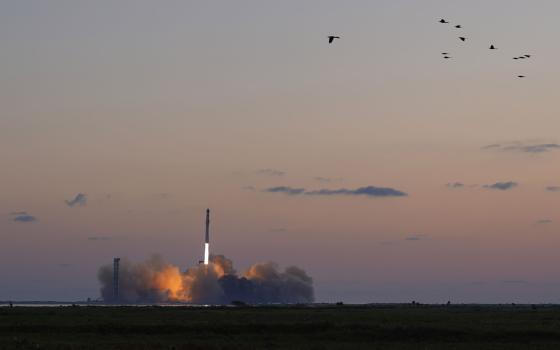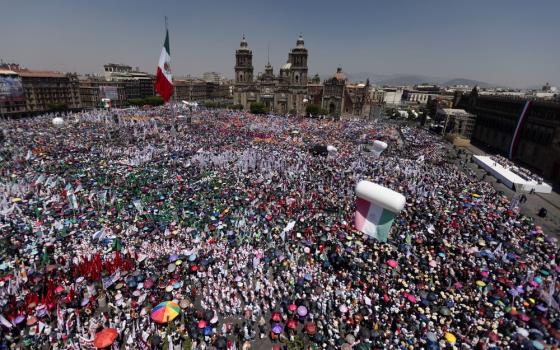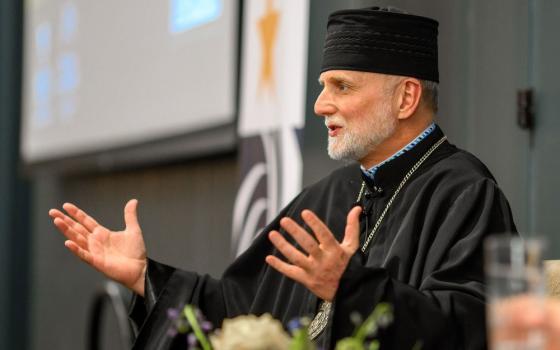By JOHN L. ALLEN JR.
Rome
As of today, the Vatican officially has a brand new department dedicated to reawakening Christianity in the secular West. Whether this new “Pontifical Council for Promotion of the New Evangelization” will actually trigger a Christian renaissance across the First World, however, very much remains to be seen.
So far, the lone concrete project announced by the office is a celebration in 2012 of the twentieth anniversary of publication of the Catechism of the Catholic Church.
Pope Benedict XVI announced plans to create the new office, known in the technical parlance of the Vatican as a “dicastery,” on June 29, the liturgical feast of Sts. Peter and Paul. Only today, however, was the legal document formally creating the office published.
| Read NCR's full coverage of the Synod of Bishops for the Middle East: Index of stories from the Synod. |
It came in the form of a motu proprio, meaning a document under the pope’s personal authority, titled in Latin Ubicumque et semper, “Everywhere and always.” It was presented in a Vatican briefing by the first president of the new council, Italian Archbishop Rino Fisichella.
At the level of diagnosis, the motu proprio makes a compelling case that ancient Christian lands, above all in Europe, are today experiencing a process of “de-Christianization,” driven by an increasingly secular cultural milieu.
Benedict pointed to a “worrying loss of the sense of the sacred,” which calls into question premises that once seemed beyond discussion: “Faith in a creator and providential God, the revelation of Jesus Christ as the lone savior, and a common understanding of the fundamental experiences of the human person including birth, death, life in the family, and reference to a natural moral law.”
In place of those traditional pillars of Western culture, Benedict said, what’s spreading today is “religious indifference and the total practical insignificance of God for even the most serious problems of life,” an attitude which he said “is no less worrying and subversive than overt atheism.”
In his own remarks this morning, Fisichella termed all this a form of “relativism” which is “the characteristic note of recent decades, influenced more and more by a secularism which tends to distance our contemporaries from their fundamental relationship with God.”
Later on, Fisichella pointed to three touchstone speeches by Benedict XVI which deal with the relationship between reason and faith, and thus religion and secular culture, which in a sense represent the “charter documents” of the new dicastery:
•tBenedict's speech to the world of culture at the Collège des Bernardins in Paris, France, on Sept. 12, 2008;
•tHis speech to the academic community at Vladislav Hall in the Prague Castle in the Czech Republic, Sept. 27, 2009
•tHis speech to political and civic leaders in Westminster Hall in London on Sept. 17, 2010.
No doubt, the idea of an “ecclesiastical winter” in Europe has a point.
Sociological data confirms that religious faith and practice is in decline across the continent. The most recent Global Attitudes Project by the Pew Forum, for example, found that strong majorities in other parts of the world say that religion is “very important” to them, while in Europe the highest mark was in Poland with 36 percent. The numbers for Italy (27 percent), Germany (21 percent), and France (11 percent) are even lower.
The $64,000 question, however, is whether creating a new layer of bureaucracy in the Vatican is likely to redirect a cultural process that’s arguably at least 500 years old, dating from the Protestant Reformation and Europe’s Wars of Religion.
Benedict’s motu proprio lists five responsibilities for the new dicastery:
•tDeepening the theological and pastoral meaning of “new evangelization”;
•tPromoting, in collaboration with bishops’ conferences, papal teaching about the new evangelization;
•tRaising awareness about activities already under way in local churches and promoting new ones, drawing on the resources of religious orders and lay movements;
•tStudying modern means of communications;
•tPromoting the Catechism of the Catholic Church.
At least in principle, none of those tasks is exactly new, and it remains somewhat vague what they might mean in practice.
Fisichella attempted to flesh out the picture this morning.
I tried to put the key question as directly as possible, telling Fisichella that people tend to be naturally suspicious of what seem to be bureaucratic solutions to cultural problems. Could he reassure us, I asked during the briefing, that this new office is more than a hollow bureaucratic gesture?
In reply, Fisichella said he could offer three “guarantees.”
First: “You have to have faith in Benedict XVI,” he said. “He’s not a man of bureaucracy, he’s a man of proclamation.”
“He’s a man of profound cultural intelligence,” Fisichella said. “He wanted to commit the church in a concrete way to the mission it’s always had.”
Second: “I’m not a man of bureaucracy either,” Fisichella said. “I’m a man of study. I don’t see the danger of bureaucracy or excessive reliance on structures. Our focus is on the help this dicastery has to give to the pastoral activity of the Holy Father.”
Third: The new evangelization, Fisichella said, is not a “bureaucratic act,” but rather a reminder that all of the church’s activity must be conditioned by its goal, which is the proclamation of the gospel to the women and men of today.
“First we have to study the challenges, and then we will find the necessary forms to overcome them,” he said.
Another journalist pressed Fisichella on the publication of the motu proprio itself. If the whole point of the new dicastery is to give the Catholic church a new sense of missionary outreach, why was the pope’s document published first only in Latin and Italian – hardly the languages of the vast majority of the planet?
Fisichella replied that it’s only as of today that he’s officially on the job, so he can’t comment on what happened with the document. However, he said, once the Pontifical Council is up and running, it will have sections in Italian, English, French, German, Spanish, Portuguese and Slavic.
Fisichella’s reply to a question about how the new pontifical council might engage the world of cyberspace was telling in terms of the long road ahead: “Right now, I’m just hoping to get a computer in my office so I can get on the Internet myself,” he said.
The spirit of Fisichella’s remarks seemed to be an invitation to patience.
“When a baby is born, the parents want to think right away about what it will do when it’s grown up,” he said. “Right now, however, I’m satisfied to think about the things the baby needs.”



